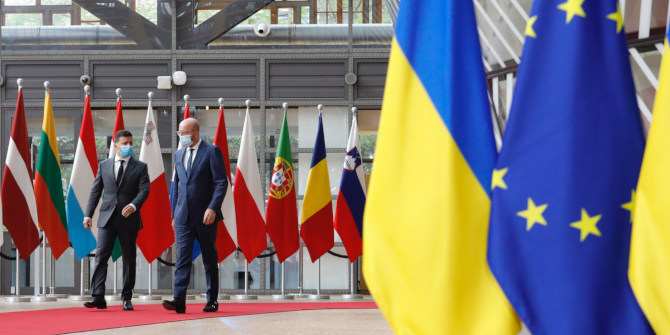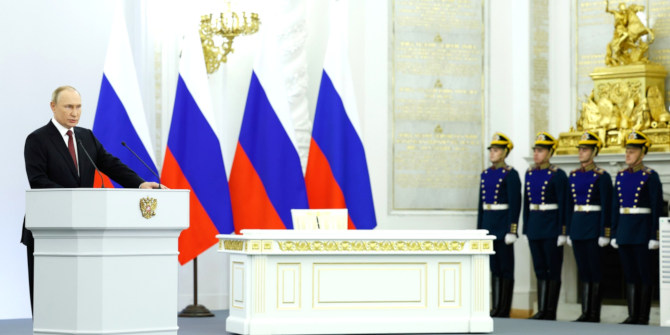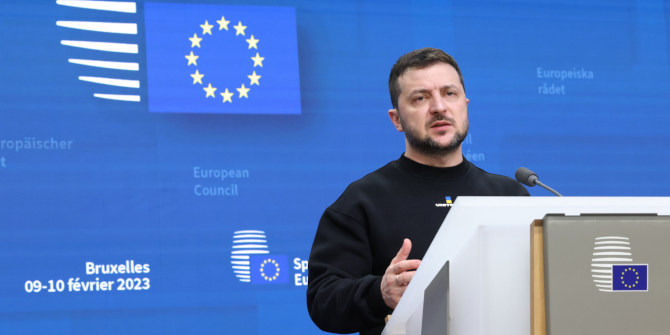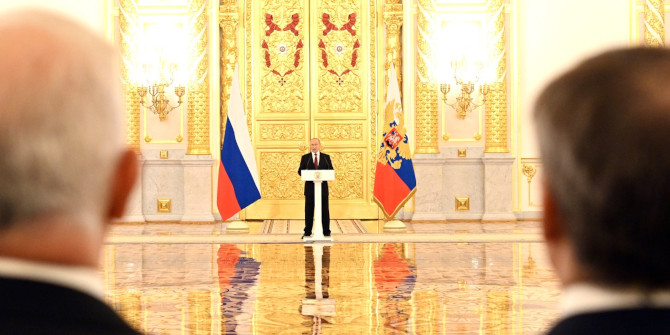Amongst other things, the conflict in Ukraine has demonstrated the failure of western diplomacy to contain the outbreak of war in Europe. Over the past decades, one aspect of this diplomacy has involved the role of scientific and research relationships between Russia and the West, or ‘science diplomacy’. In this post, Doubravka Olšáková and Sam Robinson discuss how the Russia-Ukraine war highlights the limitations of conceptions of science diplomacy since the turn of the 21st century.
Science diplomacy is a distinctly 21st Century construction. Popularised by the American Association for the Advancement of Science (AAAS) and Royal Society in 2011, science diplomacy was not a concept developed during the Cold War, the post-war settlement of Europe, or even the post-Cold War age. The term “science diplomacy” itself first emerged from the US State Department around the year 2000, in the wake of terrorism, an unsettled Middle East, and the rise of global scientific challenges (climate change and world health management). This is the first myth of science diplomacy, that it is a concept with a long history.
The term unified a previous Cold War era split between the agenda of cultural (soft power) and military attachés (hard power). Previously, cultural diplomacy covered both culture and science, while military attachés agendas included not only military items, but also technologies. Science diplomacy, as defined by the AAAS, is deliberately wide enough to cover soft as well as hard power in international relations. Consequently, rather than being a strength, this broad all-encompassing definition and role for science diplomacy, creates tensions during times of crisis, but works very well as a concept during times of peace. Science diplomacy’s primary mission is therefore the same as the mission of diplomacy itself, to promote and preserve national interests. Thus, the second myth of science diplomacy, is that science is a synonym for peace.
Science diplomacy as a European project
During the Cold War science and technology were in the vanguard of both technological rivalry between the global superpowers, and central to efforts to find a détente between rival ideological regimes. This uncomfortable duplexity saw science and technology cast simultaneously as villains and saviours in Cold War political narratives.
The fall of communism in Europe raised questions over what new relationship between science and international policy would emerge. Post-soviet countries in east-central Europe moved into closer relationships with, and subsequently joined the European Union through the 1990s, with full membership for many coming in 2004. Scientific schemes like the European Research Council, the FP7 programme, and the subsequent Horizon 2020 scheme, along with various EU council funds were directed towards building greater scientific cooperation, and to a limited extent generating scientific capacity within the whole of the EU. However, there was and is more than one possible interpretation of the ERC’s mission to undertake ‘Frontier Science’. European integration in this case was not done under the banner of science diplomacy, but rather within the larger project of developing all of Europe. This was a socio-political-economic mission, and science and technology were integral to this process.
During the Cold War science and technology were in the vanguard of both technological rivalry between the global superpowers, and central to efforts to find a détente between rival ideological regimes.
In contrast, Russian science did not reform to the same extent, the result has been greater distance. This has undermined the concept of science being for peace, by underplaying how powerful EU science has become. From the outside science diplomacy looks different.
A Russian science?
Russian scientists have retained a reputation for excellence inherited from the Soviet era. This reputation maintained since the 1990s is based on the widespread assumption that Russian science is a direct descendant of Soviet science. These are, however, assumptions based on colonial principles of transfer of knowledge and technologies: for instance, Czechoslovakia, Poland, Hungary and the former GDR contributed to the positive reputation of Soviet technology to a considerable extent.
From 2017 to 2019, 24% of all Russian scientific texts were written in collaboration with scientists from abroad. The main subjects were artificial intelligence, energy, and materials. The main partners were the USA and Germany, followed by France, Great Britain, and China. Whilst Russian scientists have continued to build collaborations and are important actors within international scientific cooperation’s (such as, the International Space Station, the IPCC, and the WHO), Russian scientific structures and diplomatic initiatives have also become directed towards the Russian speaking world and its diaspora.
For example, the Skolkovo project. One of the most ambitious scientific and technological projects of post-Soviet Russia. A ‘Moscow Silicon Valley’ is financed directly by the Russian government, but its main international partner, the Massachusetts Institute of Technology, terminated their financing and cooperation agreement at the end of February. Regardless, its objective mirrors that of EU science policy, namely, to use science to attract entrepreneurial investment that builds international prestige and more importantly incentivises scientific collaboration to boost GDP. Similarly, the creation of a Russian Covid-19 vaccine very deliberately named Sputnik and fully intended to invoke Cold War notions of Russian scientific competition and superiority.
A return to realist science diplomacy?
The EU and the US have chosen not to engage in these moves, sticking rigidly to their notion that science is and can never be political. Equating politically motivated science as bad science. For example the European Code of Conduct for Research Integrity that states that “research ideally develops independently of pressure from commissioning parties and from ideological, economic of political interests.”
This has developed alongside the equally naïve notion that scientific communities co-operating scientifically cannot possibly be affected by broader geopolitical ambitions. As such, science diplomacy hasn’t learned from the past; its current regimes and logics are unprepared for the current situation. Science diplomacy continues to rely on very well-known and safely tested means, such as replacing institutional cooperation with personal networks of scientists (such as the historic Pugwash network).
Science diplomacy hasn’t learned from the past; its current regimes and logics are unprepared for the current situation
Whilst withdrawing from scientific collaborations, as a part of the wider sanction’s regime, certainly hurts Russian science. Claims that have been made about science diplomacy as the ultimate backchannel, a space where communication will never cease, have been found wanting. Whilst this may be true in certain specific areas, such as the International Space Station (for now). The resulting gains have hitherto hardly lived up to the optimistic billing science diplomacy advocates have trumpeted for years as the “built” infrastructures. Science is power. The strength of science diplomacy does not lie in stopping the war through direct communication with Moscow, it will be in bringing allies closer together, and when the time comes in operationalising what resources science can muster to rebuild Ukraine. Post-conflict there will be a need to slowly work out a new scheme for engaging with a democratic scientific landscape in Russia.
It is time to stop mythologising science diplomacy as being an all-powerful tool and to admit its limitations. Now is also the time to question definitions of science diplomacy. Might not a new concept of science diplomacy emerge to serve the insecure world in which we live with its powerful nuclear armed dictators, its punishing injustices, its global challenges, and its continuing colonial legacies and mindsets? International organisations, diplomats and scientists ought to learn from this devastating conflict. We can build for a better tomorrow, science can lead, but we should be careful of simple all-encompassing prescriptions; especially those based on very shaky historical foundations.
Note: This article first appeared at our sister site, LSE Impact. It gives the views of the author, not the position of EUROPP – European Politics and Policy or the London School of Economics. Featured image credit: ThisisEngineering RAEng on Unsplash






Science diplomacy
When a “new” definition, or slogan, strikes me, I am making an attempt to understand. After reading few articles about “Anthropocene” I concluded that it is just a slogan used by few academics to promote themselves, and get more grants. After reading the note by Olsakova and Robinson, I suspect that “science diplomacy” belongs to the same category, and that the Authors share my feeling. I am retired after a career in science, working with, or close to, researchers of the entire world; one of my last cooperation was with Brno (CZ), and benefited from European efforts to promote scientific connections with the “new” Eastern nations.
Like with Internet, we have an open science and a dark science; the first one shares its results in publications on reputable international journals because these papers are important for the individual careers and the institutions. The second one is secret, paid for by private groups, or by the variously named “Departments of Defense”. A somehow similar divide seems to separate a “cultural” attache and a “military” attache (like Putin was).
Western governments often try to make open science (and education) more international, favoring in particular the exchange of people; beautiful projects, but with little direct impact upon local institutions and their “rules of selection”. It is not the place to argument in favor of these programs because their results are usually too long-range and too hidden.
The same may be true for “science diplomacy” even if I am too ignorant to understand what it means. The Ukraine war has opened a fully new phase of diplomacy where not “science” but the ability of thinking “out-of-the-box” will make a difference. Diplomacy may start it all (and I am ready to provide my opinion about how it may occurr) but the rebuilding of Ukraine requires the contributions of hard sciences, soft sciences, politics, inspired/inspiring leadership, and so on.
Most respectfully,
Marco Villa
“The EU and the US …. [stick] rigidly to their notion that science is and can never be political.”
Presumably a ‘not’ is missing after ‘is’?